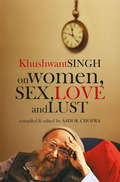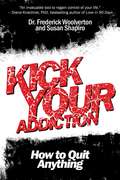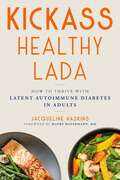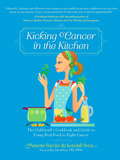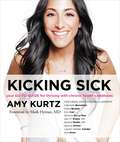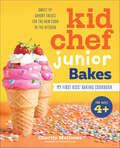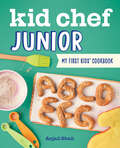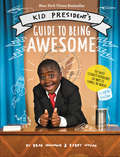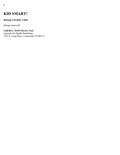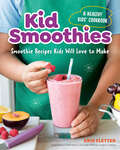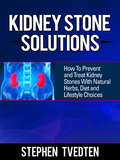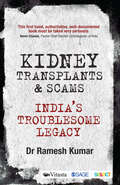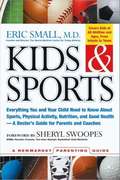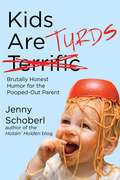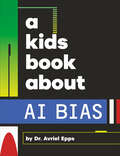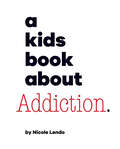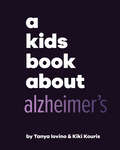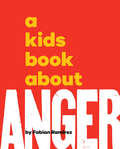- Table View
- List View
Khel Yog (Sharirik Shikshan ani Kalyan) class 3 - NCERT - 25: खेल योग (शारिरीक शिक्षण आनी कल्याण ) ३रीं कक्षा - एनसीईआरटी - २५
by Rashtriy Shaikshik Anusandhan Aur Prashikshan Parishadखेल और योग कक्षा 3 के विद्यार्थियों के लिए एक उपयोगी पुस्तक है जो उनके शारीरिक, मानसिक और नैतिक विकास को बढ़ावा देती है। यह पुस्तक खेल-कूद, योगाभ्यास और शारीरिक गतिविधियों के माध्यम से विद्यार्थियों में अनुशासन, एकता, आत्म-नियंत्रण और सहयोग की भावना को विकसित करती है। इसमें सरल भाषा में विविध खेलों, योगासनों और व्यायामों का परिचय दिया गया है ताकि बच्चे इन्हें सहज रूप से समझ सकें और अभ्यास कर सकें। पुस्तक में चित्रों, गतिविधियों और समूह कार्यों के माध्यम से विद्यार्थियों की भागीदारी और रुचि को बढ़ाया गया है। यह पाठ्यक्रम न केवल स्वास्थ्यवर्धक जीवनशैली की दिशा में प्रेरित करता है, बल्कि विद्यार्थियों को सक्रिय, आत्मविश्वासी और स्वस्थ नागरिक बनने के लिए भी प्रेरित करता है।
Khel Yog (Sharirik Shikshan ani Kalyan) class 3 - NCERT - 25: खेळ योग (शारिरीक शिक्षण आणि कल्याण ) इयत्ता ३रीं - एनसीईआरटी - २५
by Rashtriy Shaikshik Anusandhan Aur Prashikshan Parishad“खेळ योग” या पुस्तकात योगशास्त्र व खेळ या दोन महत्त्वाच्या अंगांचा समन्वय साधण्याचा प्रयत्न केला आहे. शरीराची तंदुरुस्ती, मानसिक संतुलन व एकाग्रता ही दोन्ही क्षेत्रांची समान ध्येये आहेत. लेखकाने सोप्या भाषेत योगाभ्यासाचे महत्त्व, त्यातील विविध आसने, प्राणायाम व ध्यान यांचे स्पष्टीकरण केले आहे. खेळाडूंना उत्तम कामगिरी करण्यासाठी नियमित योगाभ्यास कसा उपयुक्त ठरतो हे दाखवले आहे. पुस्तकात खेळाडूंच्या शारीरिक क्षमतेबरोबरच मानसिक तयारीलाही विशेष महत्त्व दिले आहे. योगामुळे मनःशांती मिळते, ताणतणाव कमी होतो, एकाग्रता वाढते आणि आत्मविश्वास दृढ होतो. यामुळे खेळाडूंना स्पर्धात्मक वातावरणात आपली सर्वोत्तम क्षमता दाखवता येते. तसेच विविध खेळांमध्ये होणाऱ्या दुखापती टाळण्यासाठी व शरीर लवचिक ठेवण्यासाठी योग किती आवश्यक आहे हेही समजावून सांगितले आहे. लेखकाने शालेय विद्यार्थ्यांपासून व्यावसायिक खेळाडूपर्यंत सर्वांसाठी उपयुक्त असे मार्गदर्शन दिले आहे. निरोगी जीवनशैली अंगीकारण्यासाठी योग व खेळ यांचा संगम कसा साधावा हे पुस्तक ठोसपणे अधोरेखित करते.
Khel Yoga (Physical Education And Well-being Textbook) class 3 - NCERT-25
by National Council of Educational Research and Training“Khel Yoga” is a Class 3 textbook developed by NCERT to promote physical education and holistic well-being among young learners. It focuses on developing motor skills, introducing students to traditional Indian games, and initiating them into age-appropriate yogic practices. The book is divided into three units—Basic Motor Movements, Our Games, and Yoga—each filled with engaging, playful activities that foster physical fitness, emotional resilience, cooperation, and cultural rootedness. It promotes peer learning and encourages children to play with friends and family while instilling values like empathy, discipline, and teamwork. Through structured sessions and reflective "Circle Time," students not only enhance physical abilities but also develop social and emotional intelligence. The textbook also integrates safety practices, inclusive participation, and thoughtful planning to ensure an enriching and joyful learning experience. It serves as a valuable resource for teachers, students, and parents alike, contributing to the overall development of a healthy, happy child.
Khel Yoga (Physical Education And Well-being Textbook) class 4 - NCERT-25
by National Council of Educational Research and TrainingKhel Yoga – Physical Education and Well-being (Grade 4) is a thoughtfully crafted NCERT textbook that integrates traditional games, yoga, and movement-based activities to promote the physical, mental, and emotional growth of children. Building on the foundations laid in Grade 3, it introduces three core units: Basic Motor Movements, Our Games, and Yoga. Through enjoyable tasks like throwing, catching, kicking, and striking, students enhance their motor skills and coordination. Traditional Indian games connect them to cultural heritage while promoting teamwork and empathy. Yoga is introduced through playful activities to develop mindfulness and healthy habits. Each session includes Circle Time to reflect on emotions, inclusion, and fair play. With a structured annual plan, the book encourages active participation, holistic well-being, and the development of values like discipline, respect, and cooperation. It also guides teachers in ensuring safe, engaging, and inclusive physical education classes while involving parents and the community in the learning journey.
Khel Yoga (Physical Education And Well-being Textbook) class 5 - NCERT - 25
by National Council of Educational Research and TrainingKhel Yoga – Physical Education and Well-being (Grade 5) is a thoughtfully designed textbook by NCERT that integrates physical fitness, traditional games, and yoga into the holistic development of children at the preparatory stage. It builds upon the foundation laid in earlier grades, encouraging students to engage in diverse activities that enhance motor skills, coordination, strength, endurance, and socio-emotional learning. Divided into three main units—Basic Motor Movements, Our Games, and Yoga—the book introduces children to fun yet structured practices such as throwing, catching, kicking, striking, balancing, and playful gymnastic movements. Alongside, it revives traditional Indian games from different regions, promoting cultural rootedness, teamwork, and inclusivity while fostering creativity and problem-solving. The yoga unit acquaints learners with preparatory practices, simple asanas, kriyas, pranayama, and meditation techniques that cultivate mindfulness, discipline, and healthy lifestyle habits. Emphasis is also placed on “circle time,” where students reflect on their experiences, discuss values like cooperation, fairness, and empathy, and develop resilience. Designed with the principles of the National Curriculum Framework 2023, the book not only equips learners with physical competence but also nurtures emotional well-being, respect for diversity, and lifelong love for fitness, ensuring they grow as balanced, confident, and compassionate individuals.
Khele Karen Sikhen class 1 - Maharashtra Board: खेलें करें सीखें १लीं कक्षा - महाराष्ट्र बोर्ड
by Maharashtra Rajya Pathyapustak Nirmiti Va Abhysakram Sanshodhan Mandal Pune"खेलें, करें, सीखें" पहली कक्षा के विद्यार्थियों के लिए तैयार की गई एक बहुआयामी पाठ्यपुस्तक है, जो स्वास्थ्य, शारीरिक शिक्षा, कार्यानुभव और कला शिक्षा को एकीकृत रूप में प्रस्तुत करती है। इस पुस्तक का उद्देश्य बच्चों को खेल-खेल में सीखने के लिए प्रेरित करना है। इसमें शारीरिक गतिविधियाँ, कला, संगीत, नाट्य, हस्तकला और अन्य रचनात्मक उपक्रमों को शामिल किया गया है, जिससे बच्चों का संपूर्ण विकास हो सके। पुस्तक में खेलों और गतिविधियों के माध्यम से शारीरिक संतुलन, अनुशासन, रचनात्मकता और आत्म-अभिव्यक्ति को बढ़ावा दिया जाता है। इसमें दैनिक जीवन से जुड़ी आदतों, स्वच्छता, पर्यावरण जागरूकता और नैतिक मूल्यों पर भी विशेष ध्यान दिया गया है। यह पाठ्यपुस्तक बच्चों को उनकी रुचियों और क्षमताओं को विकसित करने में मदद करती है और उन्हें सीखने की प्रक्रिया को आनंददायक बनाती है।
Khele Karen Sikhen class 5 - Maharashtra Board: खेलें करें सीखें ५वीं कक्षा - महाराष्ट्र बोर्ड
by Maharashtra Rajya Pathyapustak Nirmiti Va Abhysakram Sanshodhan Mandal Pune‘खेलें, करें, सीखें’ पाँचवीं कक्षा के विद्यार्थियों के लिए बनाई गई एक पाठ्यपुस्तक है, जो स्वास्थ्य, शारीरिक शिक्षा, कार्यानुभव और कला शिक्षा को एकीकृत करती है। इस पुस्तक का उद्देश्य बच्चों को खेल, गतिविधियों और रचनात्मक कार्यों के माध्यम से व्यावहारिक और जीवनोपयोगी शिक्षा प्रदान करना है। इसमें व्यायाम, योग, नृत्य, नाट्य, संगीत, चित्रकला, हस्तकला, कृषि, जल प्रबंधन, आपदा प्रबंधन और स्वच्छता जैसे विषयों को समाहित किया गया है। बच्चे न केवल खेल और गतिविधियों का आनंद लेते हैं, बल्कि वे आत्मनिर्भरता, अनुशासन, रचनात्मकता और सामाजिक उत्तरदायित्व भी सीखते हैं। पुस्तक में विद्यार्थियों को स्वस्थ जीवनशैली अपनाने, अच्छी आदतें विकसित करने, और विभिन्न कौशलों को आत्मसात करने के लिए प्रेरित किया जाता है। इसमें मौलिक हलचलों, प्रतियोगिताओं, उत्पादक उपक्रमों और पारंपरिक खेलों की जानकारी दी गई है, जिससे बच्चों में व्यावहारिक ज्ञान और आत्मविश्वास विकसित हो सके।
Khushwant Singh on Women, Sex, Love and Lust
by Khushwant SinghAn anthology of Khushwant Singh’s best writings on his favorite subjects, Women, Sex, Love and Lust is at once witty, informative, thought-provoking and flagrant. Definitely a book you can’t afford to miss! If you are looking for answers to eternal questions like which came first – love or lust, or debates pertaining to celibacy, chastity or arranged marriages, Khushwant Singh delivers his unique exposé. Whether he is analysing the fine dividing line between obscenity, pornography and erotica, describing sex from ‘Chaturbhani’ (200-350 B.C.) or his ideas of a composite Indian woman, Khushwant holds the reader’s attention effortlessly. But that isn’t all – years before terms such as ‘gender issues’ or ‘gender divide’ became popular, he was writing, thinking and sharing his views on them. His deliberations reveal an unexpected side to Khushwant . . . in these pages you’ll also find a rare glimpse of Khushwant the feminist. Women, Sex, Love and Lust abounds with Indian as well as foreign myths, legends, proverbs, and poems ranging from Chaucer, Shakespeare, Whitman to Kalidas, Iqbal and Faiz. Almost each page offers you delectable quotes from Russell to Wodehouse along with special anecdotes which could only come from the inimitable Khushwant. Only he could share with you his intense experience of nudo-phobia suffered in Sweden, his acute observation of Indian whoremongers when abroad, scandals amongst the literati and glitterati – H. G. Wells as a compulsive fornicator or Georges Simenon hammering away at his typewriter (and his women) at the age of eighty are only a few revelations.
Kick Your Addiction: How to Quit Anything
by Susan Shapiro Frederick WoolvertonIs a smoking, alcohol, food, gambling, Internet, drug, or sex addiction holding you back from getting what you want most? Over the past twenty-five years, renowned addiction therapist Dr. Frederick Woolverton has used his dynamic, empathetic approach to help thousands of addicts achieve long-term recovery-including himself. He sees the specific habit as less important than the underlying chaos and fear that motivate the urge to soothe ourselves with bad habits. The solution, he has found, requires only a better understanding of yourself and a change in attitude.Using real patient examples as well as research and his own experience, Dr. Woolverton and coauthor and former patient Susan Shapiro show how to thrive without self-medicating. Woolverton's specific instructions do not require an expensive therapist, rehab, a twelve-step program, or a higher power (though he does make readers aware of those viable options). Let him help you beat your addiction. When you conquer a toxic habit, you are leaving room for something beautiful to take its place.
Kickass Healthy LADA: How to Thrive with Latent Autoimmune Diabetes in Adults
by Jacqueline HaskinsThe award-winning first book for the general public on LADA (Latent Auto-immune Diabetes in Adults), endorsed by a former president of the American Diabetes Association, Kickass Healthy LADA is a fun, empathetic, and practical guide brimming with insights and inspiration. If you are one of the millions of Americans with Latent Autoimmune Diabetes in Adults (LADA), you may not even know it. You may be one of the ten percent of people diagnosed with type 2 diabetes who actually have LADA. Even if you do know that you have LADA, sometimes called &“diabetes 1.5,&” you&’re likely to be inundated with unhelpful advice and potentially harmful treatments, leaving you feeling confused and overwhelmed. That was Jacqueline Haskins&’ experience. After visiting five doctors before getting helpful guidance, and realizing there wasn&’t a friendly &“how-to&” book meant for the general public about LADA—she decided to write one. Winner of the 2023 American BookFest Award in Health and a 2023 Reader&’s Favorite Five-Star selection, Kickass Healthy LADA is a welcoming, supportive book packed with practical strategies and tips that can be tailored to any lifestyle or heritage. This medically vetted go-to guide offers patients and their loved ones relief, hope, and critical information including: A detailed breakdown of the different diabetes diagnoses What makes LADA different and how to find the best treatment team Insulin: what it is, what it does, and how to know if we need more of this natural hormone Tools for good health with LADA, including food and nutrition advice Introducing Carb-Craft: how to safely enjoy the foods you love With a biologist&’s keen eye, a patient-advocate&’s tenacity, and the humor of a trusted friend, Jacqueline offers an essential toolkit for anyone diagnosed with LADA.
Kicking Cancer in the Kitchen: The Girlfriend's Cookbook and Guide to Using Real Food to Fight Cancer
by Kendall Scott Annette RamkeKicking Cancer in the Kitchen is the bible for the woman who has been handed the cancer card--and for the one who never wants to get it. Authors Annette Ramke and Kendall Scott know exactly what it’s like to deal with "the Big C. ” Here they share girlfriend-style, real-life knowledge and experience about the healing power of food, along with their stories of cancer ups and downs--with more than 100 recipes for fighting cancer and soothing symptoms of treatment. Whether someone is in the thick of "Cancer World” and wants to know what to expect, or for anyone who wants to do all they can to boost their health, Kicking Cancer in the Kitchen offers guidance on not only surviving, but thriving--before, during, and after cancer.
Kicking Sick: Your Go-to Guide For Thriving With Chronic Health Conditions
by Amy KurtzHas a chronic health issue taken over your life? More than half of us in the US are struggling with at least one. Amy Kurtz gets it. Starting in her mid-teens, she endured two perfect storms of illness that progressed into her twenties. It earned her the label "the sick chick"--and the shame, fear, isolation, and frustration that comes with it. She's radically improved her health, and today she's helping men and women of all ages live well regardless of their health situation. With honesty, humor, and empathy, Kicking Sick shows you how to jettison despair, tune in to your body and inner wisdom, take charge, and build an effective support circle of medical experts, friends, and family. Kicking Sick also brings you essential advice from Amy's own A-team of experts--the ones crucial to her own turnaround: her personal physician Mark Hyman, gastroenterologist Gerard Mullin, endocrinologist Philip Felig, Crazy Sexy Cancer author Kris Carr, new thought leader Gabby Bernstein, and renowned yogi Elena Brower, plus many real life "glow warriors. "
Kid Chef Junior Bakes: My First Kids Baking Cookbook (Kid Chef Junior)
by Charity MathewsKids baking is a piece of cake with this colorful kids' cookbook for ages 4 to 8. Baking for kids can be so exciting! Kid Chef Junior Bakes continues the tradition of every previous Kid Chef cookbook and Kid Chef Bakes cookbook, with recipes that hit the sweet spot between fun, easy, and truly tasty. With step-by-step instructions and large text that's easy to read, this baking cookbook for kids will get kids baking in no time. Whether they're learning how to make Dirt Cups with Candy Worms, Strawberry Ice Cream Cone Cupcakes, or Razzle-Dazzle Raspberry-Cream Cheese Muffins, they'll be baking for real—together with you. This kids baking book includes:A range of challenge levels—With this junior chef cookbook, kids will try a mix of recipes with different baking techniques so they can challenge themselves to practice key kitchen skills.The ultimate kid baking cookbook—From oven and knife safety, to reading a recipe, to measuring ingredients accurately, kids will learn the importance of staying safe and organized in the kitchen.Space to make it their own—There's oodles of room for doodling and decorating, plus fill-ins and jokes with each recipe in this memorable choice for a kid's first cookbook.Explore a baking book for kids that makes it simple and fun for them to learn skills and independence—and whip up dishes the whole family will love. This delightful cookbook also makes a perfect Christmas book gift or stocking stuffer for kids!
Kid Chef Junior: My First Kids' Cookbook (Kid Chef Junior)
by Anjali ShahThe fun and easy starter cookbook for kids ages 4 to 8Help kids develop their culinary know-how as they make healthy, wholesome, kid-approved meals—first with an adult and eventually all on their own! Kid Chef Junior is the ultimate kids cookbook, helping them build essential skills, practice food and kitchen safety, and gain confidence and imagination.Cooking basics for kids—With simple steps and bright visuals, this kids cookbook shows them how to use different kitchen tools; read recipes; why certain ingredients go together; and how to chop, stir, whisk, and pour—just like a real chef!Pictures of each recipe—Colorful photos help kids choose the recipe they want to make and see what the finished dish should look like.Guidance for parents—Find tips for helping your child succeed in the kitchen and supervision labels so you know when to step in and when to let your little chef take the lead.Give budding chefs confidence in the kitchen with fun, yummy recipes from Kid Chef Junior.
Kid President's Guide to Being Awesome
by Brad Montague Robby Novak"This is LIFE, people! You've got air coming through your nose! You've got a heartbeat! That means it's time to do something!" announces Kid President in his book, Kid President's Guide to Being Awesome. From YouTube sensation (75 million views and counting!) to Hub Network summer series star, Kid President--ten-year-old Robby Novak--and his videos have inspired millions to dance more, to celebrate life, and to throw spontaneous parades.In his Guide to Being Awesome, Kid President pulls together lists of awesome ideas to help the world, awesome interviews with his awesome celebrity friends (he has interviewed Beyoncé!), and a step-by-step guide to make pretty much everything a little bit awesomer. Grab a corn dog and settle in to your favorite comfy chair. Pretend it's your birthday! (In fact, treat everyone like it's THEIR birthday!) Kid President is here with a 240-page, full-color Guide to Being Awesome that'll spread love and inspire the world.
Kid Smart: Raising A Healthy Child
by Cheryl TownsleyAs I watch adults and children go through the check-out lane at grocery stores, I am continually amazed and aghast at the con¬tents of their carts. Their carts are piled high with packaged foods, sugared snacks and sodas, and many other non-food items. Occasionally I will see a head of iceberg lettuce or a few bananas peeping over the piles of “other stuff.” I look from the cart to the child and then to the adult. The face of such food choices is always apparent.
Kid Smoothies: Smoothie Recipes Kids Will Love to Make
by Erin FletterA healthy kids&’ cookbook of fun, easy smoothie recipes that teaches kids basic kitchen skills without using a stove or tons of equipment!Dragon&’s Laire Cocoa Smoothie, Vanilla Bean Dream Delight, Pineapple Paradise, Strawberry Lemonade Stand Pops—these are just some of the yummy, kid-approved recipes you&’ll find in Kid Smoothies by Erin Fletter, co-founder of Sticky Fingers Cooking. In this book, kids ages 6 to 9 will gain confidence in the kitchen as they take charge making delicious smoothies from start to finish. They&’ll learn to handle basic tools and equipment and prep like a pro—cutting fruit, zesting citrus, operating a blender, and more. Filled with recipes for refreshing, creamy, and fruity smoothies, smoothie bowls, and smoothie pops, there is a fresh and healthy treat for everyone in the family to enjoy. 40+ BEGINNER-FRIENDLY RECIPES: Kids can practice their kitchen skills with abundant and fun smoothie, smoothie bowl, or smoothie pop recipesEASY INTRODUCTORY COOKBOOK: With simple instructions, age-appropriate guidance, and minimal equipment, these no-cook recipes are ideal for teaching kitchen fundamentals to aspiring kid chefs BEAUTIFUL COLORFUL PHOTOS: Spark creativity with visuals of inspiring smoothie creations, garnishes, and toppingsTRY ALL THE COLORS: Encourages healthy eating with tips and pointers on nutrition—a fun and playful invitation to adventurous eating CREATE YOUR OWN SMOOTHIE: Young chefs can create their own smoothie creations and favorite combinations with easy, fill-in the blank recipes
Kidney Stone Solutions: How to Prevent and Treat Kidney Stones With Natural Herbs, Diet and Lifestyle Choices
by Stephen TvedtenDozens of effective, safe, and simple solutions for kidney health. Kidney stones are rooted in the crystallization of unprocessed minerals—and are one of the most common disorders of the urinary tract. They&’re not unusual—but they&’re still unpleasant. Fortunately, your body has an incredible ability to heal your kidneys and cleanse kidney stones if you feed it the right material. In this book, you&’ll discover how to cleanse your kidneys properly, eliminating and preventing kidney stones using powerful natural foods and remedies. You&’ll also learn about the factors that can contribute to the formation of kidney stones—which can happen in women as well as men—and the healthy habits that reduce your risk.
Kidney Transplants and Scams: India’s Troublesome Legacy
by Ramesh KumarA live kidney weighing 150-200gms is the most sought-after organ worldwide, with people willing to buy from unrelated live donors for a few lakh rupees. There are almost 2000 kidney transplants happening in India yearly – less than half this number meet the country’s legal requirements. Former Prime Minister Atal Bihari Vajpayee and the Secretary General of Rajya Sabha, Sudarshan Agarwal are the two people who helped the enactment of an organ transplant law in India. India imports dialysis machines and its first made-in India machine has just gone on clinical trial though nephrological services began here some 50 years ago. Harvesting of kidneys from unfortunate accident victims is the only solution to the shortage of kidneys for transplantation in India – with 150,000 accidents every year on the country’s deadly roads. To make kidneys available readily and legally from accident victims and the brain dead, the law needs amendment and a National Organ Harvesting Programme (NOHP) is urgently needed. In this book, Dr Ramesh Kumar reveals the stark reality of kidney scams in India and strongly advocates the need of a National Organ Harvesting Programme (NOHP).
Kids & Sports
by Sheryl Swoopes Eric SmallReadable, practical, a much-needed resource-from a pediatric sports medicine specialist-the only book that focuses on all aspects of sports, exercise, nutrition, and physical activity for kids of all ages and abilities, from infancy through adolescence. One of the few pediatricians specializing in sports medicine, Dr. Small reminds us that children are not miniature adults; they are physiologically and psychologically different. Parents and coaches need to know what sports are suitable for which age, how to prevent and treat injuries, how to plan sports programs for children with chronic conditions such as asthma or diabetes, and the importance of good nutrition and exercise. Written, organized, and designed for easy reading and reference with Q&As, charts, instructional drawings, and a detailed index, Dr. Small's book addresses kids' needs from infancy through teenage, plus devotes one section to Sports for Every Kid: covering The Young Female Athlete, The Elite Athlete, The Unnatural Athlete, The Overweight Child, The Hyperactive Child, and the Child with a Chronic Disease.
Kids Are Turds: Brutally Honest Humor for the Pooped-Out Parent
by Jenny SchoberlWhen do you know for sure that you’ve become a parent? For Jenny Schoberl, it wasn’t when a human fell out of her lady parts or the first time her baby said "Mama.” It was when she found herself, a grown woman, hiding in the bathroom to eat a candy bar, just so she didn’t have to share. <p><p> Parenthood changes people’s lives in horrifying and inevitable ways. No matter how hard you resist, you soon find yourself being that parent far too often to deny it. It won’t be long before mom jeans and minivans are calling your name.Discussing bowel movements over dinner? Guilty. Peeing with an audience? Check. Grocery shopping alone? Sounds like a tropical vacation! Watching cartoons hours after the kids have gone to bed? Now your only hobby!What do you do when motherhood turns you into someone you hardly recognize? When you open your mouth and, holy hell, your mother comes out? <p> Kids Are Turds proves that you don’t need to be Super-Mom to be a "good” mom (whatever that is), but you absolutely do need a sense of humor to get through the hard days. Either that, or you can give in, yank up your mom jeans, and rock a mile-long camel toe. So for the love of retinas everywhere, be strong!
Kids Book About AI Bias, A (A Kids Book)
by Avriel EppsLearn how AI technology can utilize human-created biases, and what we can do to create a more fair, just world.This is a book about AI (artificial intelligence) bias. AI consumes lots of information and uses that data to predict patterns. But when the information has biases, or prejudices, the predicted patterns can perpetuate injustice. If AI technology doesn't work fairly for everyone, it's not helpful AI. We can make a difference when we use our voices to advocate for fair, just technologies.
Kids Book About Addiction, A (A Kids Book)
by Nicole LendoAddiction is complicated—opening up the conversation can help kids better understand why it happens and how to cope with it.It's difficult when someone you know or love suffers with addiction, but it's a reality many kids are confronted with and need help understanding. This book was made to help explain what addiction is and help all readers cope with and validate the many feelings that come when experiencing someone's addiction.
Kids Book About Alzheimer's, A (A Kids Book)
by Tanya Iovino Kiki KourisLearn more about Alzheimer's disease, its effects on those who have it, and how to show love to someone living with it.Alzheimer's can be a big and scary-sounding word, especially if you know someone who has it. It's a disease that affects every part of daily life and impacts everyone: those who have it and the people who love them. This book lets kids know what Alzheimer's is and what it can look like, as well as offers support and encouragement for kids (and grownups) who love someone with Alzheimer's.
Kids Book About Anger, A (A Kids Book)
by Fabian RamirezHelp your kid understand what anger means and how to deal with it in healthy and positive ways.Anger is a part of life—but we never really talk about it other than to say don't be angry. This is why, too often, kids don't fully understand what they're feeling or what to do about it. That's why this book is here! To help kids understand what it means to feel angry and how to manage and process their anger in healthy and helpful ways that might even inspire positive change.

